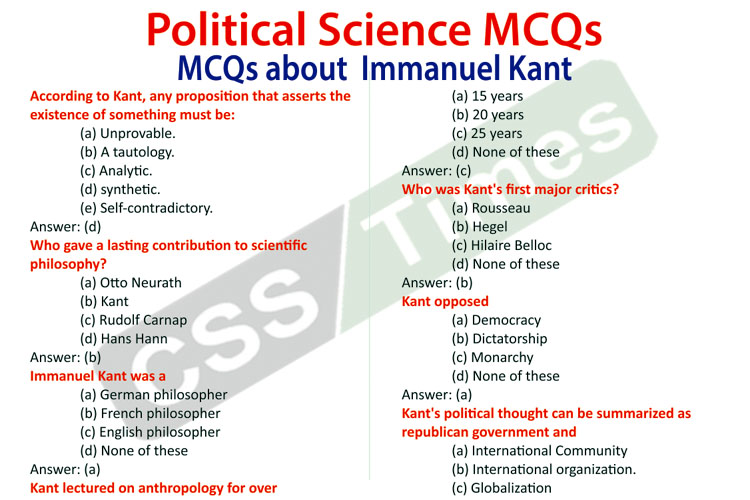Political Science MCQs
Immanuel Kant MCQs
According to Kant, any proposition that asserts the existence of something must be:
(a) Unprovable.
(b) A tautology.
(c) Analytic.
(d) synthetic.
(e) Self-contradictory.
Answer: (d)
Who gave a lasting contribution to scientific philosophy?
(a) Otto Neurath
(b) Kant
(c) Rudolf Carnap
(d) Hans Hann
Answer: (b)
Immanuel Kant was a
(a) German philosopher
(b) French philosopher
(c) English philosopher
(d) None of these
Answer: (a)
Kant lectured on anthropology for over
(a) 15 years
(b) 20 years
(c) 25 years
(d) None of these
Answer: (c)
Who was Kant’s first major critics?
(a) Rousseau
(b) Hegel
(c) Hilaire Belloc
(d) None of these
Answer: (b)
Kant opposed
(a) Democracy
(b) Dictatorship
(c) Monarchy
(d) None of these
Answer: (a)
Kant’s political thought can be summarized as republican government and
(a) International Community
(b) International organization.
(c) Globalization
(d) None of these
Answer: (b)
A phrase quoted by Kant, which is used to summarize the counter-utilitarian nature of his moral philosophy, is
(a) Fiat justitia, pereat mundus
(b) Sapiens qui prospicit
(c) Scientia et labor
(d) None of these
Answer: (a)
Kant is known for his theory that there is a single moral obligation, which he called the
(a) Hypothetical imperatives.
(b) Formula of Universal Law
(c) “Categorical Imperative”
(d) None of these
Answer: (c)
Kant developed his moral philosophy in
(a) Two works
(b) Three works
(c) Four works
(d) None of these
Answer: (b)
Kant defines his theory of perception in his influential 1781 work the
(a) Critique of Pure Reason
(b) Opus Postumum
(c) Critique of Judgement
(d) None of these
Answer: (a)
In Kant’s essay “Answering the Question: What is Enlightenment?”, Kant defined the Enlightenment as an age shaped by the Latin motto
(a) Ab antiquo
(b) Salva veritate
(c) Sapere aude
(d) None of these
Answer: (c)
Kant was an established scholar and an increasingly influential philosopher at the age of
(a) 36
(b) 46
(c) 56
(d) None of these
Answer: (b)
Immanuel Kant was born in Königsberg, Prussia in
(a) 1724
(b) 1725
(c) 1736
(d) None of these
Answer: (a)
Kant’s major work is
(a) The Critique of Pure Reason
(b) Universal Natural History and Theory of Heaven
(c) The False Subtlety of the Four Syllogistic Figures
(d) None of these
Answer: (a)
The idea that peace between countries can be established if the countries have democratic form of government at the domestic level was first propounded by
(a) Hegel
(b) Immanuel Kant
(c) J.S. Mill
(d) Karl Marx
Answer: (b)
The principle of categorical imperative is given by
(a) James Mill
(b) Herbert Spencer
(c) Jeremy Bentham
(d) Immanuel Kant
Answer: (d)
Perpetual Peace book is written by:
(a) Hans Kochler
(b) Immanuel Kant
(c) Gant, Michael M
(d) None of these
Answer: (b)
